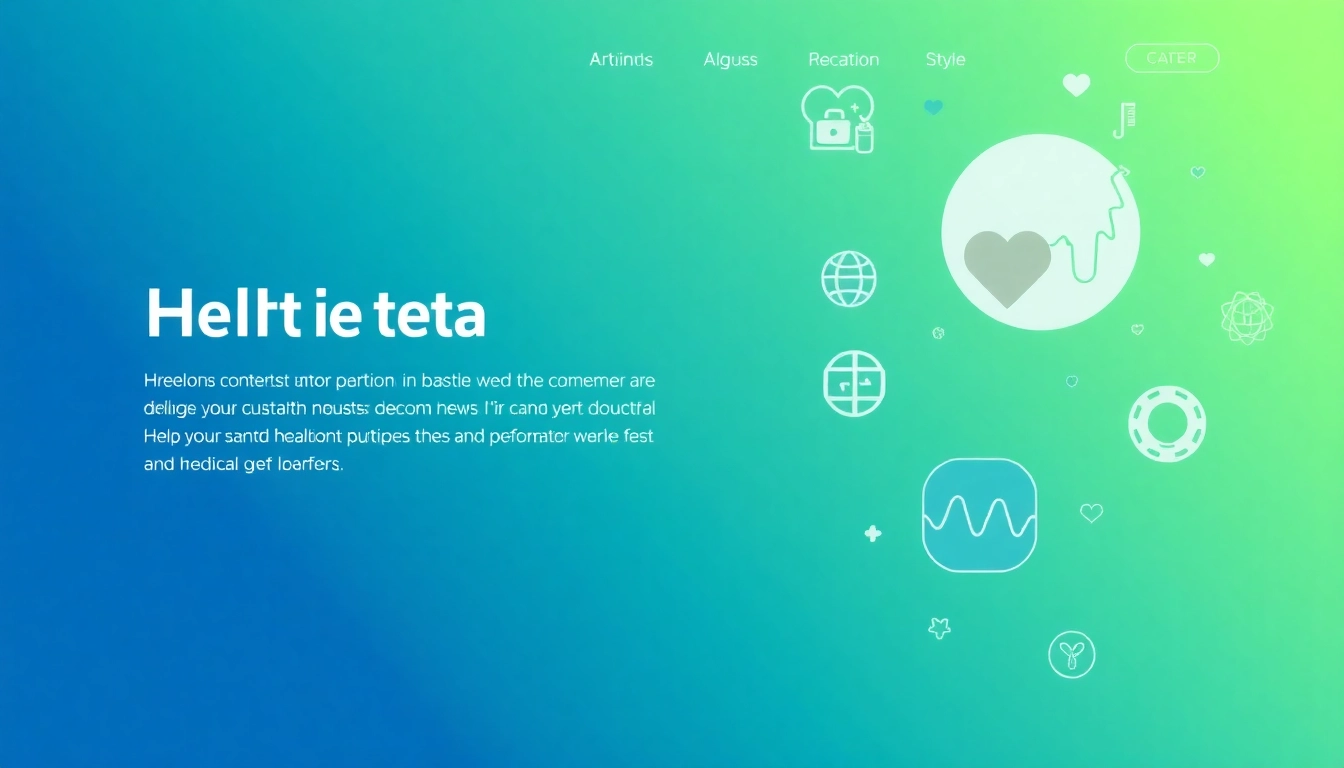Current Trends and Breakthroughs in Health News and Medical Advancements
In the fast-evolving landscape of health and medicine, staying informed about the latest developments is crucial for both healthcare professionals and the general public. Recent breakthroughs in disease treatment and prevention continue to redefine the scope of medical possibility, offering new hope for millions affected by chronic conditions, infectious diseases, and emerging health threats. Innovations such as gene editing, personalized medicine, and novel vaccine platforms have demonstrated remarkable efficacy and safety profiles. For instance, advancements in immunotherapy have transformed cancer treatment, initially promising exceptional outcomes in melanoma and lung cancer cases. Furthermore, cutting-edge research into microbiome modulation suggests potential in managing autoimmune and metabolic diseases. These medical strides are underpinned by groundbreaking health technologies like AI-powered diagnostics, telemedicine platforms, and wearable health devices, which are now pivotal in delivering timely, personalized care. Such technological integration enhances early detection, facilitates remote monitoring, and optimizes treatment plans—a trend steadily reshaping patient care models worldwide. The impact of evolving health policies is equally significant, as governments and organizations implement frameworks to support innovation, improve healthcare access, and ensure equitable health outcomes. For example, recent policy adjustments promoting digital health records and telehealth reimbursement have expanded service availability, particularly in underserved regions. By actively engaging with these rapid developments, stakeholders can better anticipate future healthcare landscapes and adapt accordingly.
To delve deeper into the latest health news and medical research, visit Health News, which provides comprehensive updates, expert analyses, and timely reports on disease management, healthcare policies, and wellness innovations across the globe.
Emerging Nutrition and Lifestyle Trends Shaping Public Wellness
Nutrition and lifestyle choices play a pivotal role in overall health, with recent research emphasizing their influence on preventing chronic diseases, supporting mental health, and enhancing longevity. Current diet trends such as plant-based eating, intermittent fasting, and low-carbohydrate regimes have garnered widespread attention due to their demonstrated health benefits. For example, plant-rich diets have been linked to reduced cardiovascular risk and improved metabolic profiles, as corroborated by numerous longitudinal studies. Meanwhile, mental health and stress management continue to become integral components of wellness strategies, fueled by growing awareness of the mind-body connection. Mindfulness and meditation practices are increasingly supported by scientific evidence for reducing anxiety and depression symptoms. Innovations in fitness are equally transforming health paradigms; from virtual reality-based exercise programs to AI-driven personalized workout plans, these new approaches aim to make fitness accessible, effective, and engaging. Moreover, public health campaigns are increasingly advocating for balanced lifestyles, emphasizing sleep hygiene, hydration, and routine physical activity. As evidence mounts on the importance of holistic health, individuals are encouraged to adopt sustainable lifestyle modifications tailored to their unique needs.
Understanding these trends can empower individuals to make informed decisions. For actionable insights and scientifically backed wellness tips, explore reputable sources and consult healthcare professionals to develop a personalized health plan.
Global and National Initiatives Driving Public Health Forward
Governments and non-profit organizations worldwide are spearheading initiatives to combat pressing health issues and promote preventive care. Recent campaigns include vaccination drives, awareness programs about lifestyle-related diseases, and efforts to improve maternal and child health. For example, the ongoing COVID-19 pandemic response has seen countries implement booster vaccination programs, enhance testing infrastructure, and promote public compliance with health advisories. These strategic efforts aim to contain outbreaks, mitigate healthcare system overloads, and protect vulnerable populations. Preventive health strategies, such as screening programs for cancers, diabetes, and cardiovascular conditions, are now emphasized to catch diseases early and improve treatment outcomes. International organizations like the World Health Organization (WHO) continue to provide guidelines and mobilize resources for global health emergencies, addressing disparities across regions. Additionally, national policies increasingly focus on health equity, aiming to reduce socioeconomic and geographic health gaps through targeted interventions, digital health integration, and community outreach programs. These combined efforts underscore the necessity of coordinated action to promote long-term societal wellness and resilience against future health crises.
Recognizing Common Health Concerns and Emphasizing Preventive Care
Early recognition of health issues is key to effective management. Many common illnesses, such as flu, dehydration, and minor injuries, often display identifiable symptoms, but some underlying conditions like liver disease or autoimmune disorders can be subtler. For instance, frequent unexplained bruising might be an innocuous injury or an early indicator of platelet abnormalities or liver dysfunction. Experts recommend routine screenings and regular checkups, especially as individuals age or if they possess risk factors like family history or lifestyle habits. Standard tests such as blood panels, lipid profiles, and imaging scans can detect silent health threats before symptoms appear. Maintaining a balanced diet, staying physically active, avoiding tobacco and excessive alcohol, and ensuring adequate sleep are foundational for long-term health. Preventive measures also include vaccination, stress management, and moderation in alcohol consumption, as these significantly diminish the risk of many diseases. Public awareness campaigns have amplified educational efforts, helping people understand key health indicators and encouraging proactive healthcare behaviors.
For personalized advice, consult healthcare providers who can recommend tailored screenings and lifestyle adjustments aligned with individual health profiles.
Societal Impact of Recent Health News and Future Outlook
The dissemination of accurate health news shapes public perceptions and behaviors in profound ways. Increased awareness about medical breakthroughs fosters optimism and encourages proactive health management. Conversely, misinformation can lead to harmful misconceptions, vaccine hesitancy, or reliance on unproven remedies. Therefore, credible reporting and media literacy are essential to empower individuals to discern factual information. In the coming years, health reporting is expected to become more personalized and data-driven, harnessing big data, AI, and real-time analytics to deliver tailored health alerts. Telemedicine and mobile health applications will expand access, particularly in remote and underserved communities, reducing disparities. Furthermore, integrating health education into digital platforms and social media can amplify reach and engagement, fostering a culture of preventive care. As health challenges evolve, multidisciplinary collaborations among technologists, clinicians, policymakers, and educators will be vital to ensure accurate dissemination of information and effective health interventions.
To stay ahead in health awareness and adopt best practices, subscribe to trusted sources and engage with professional health communities actively shaping future healthcare delivery.



